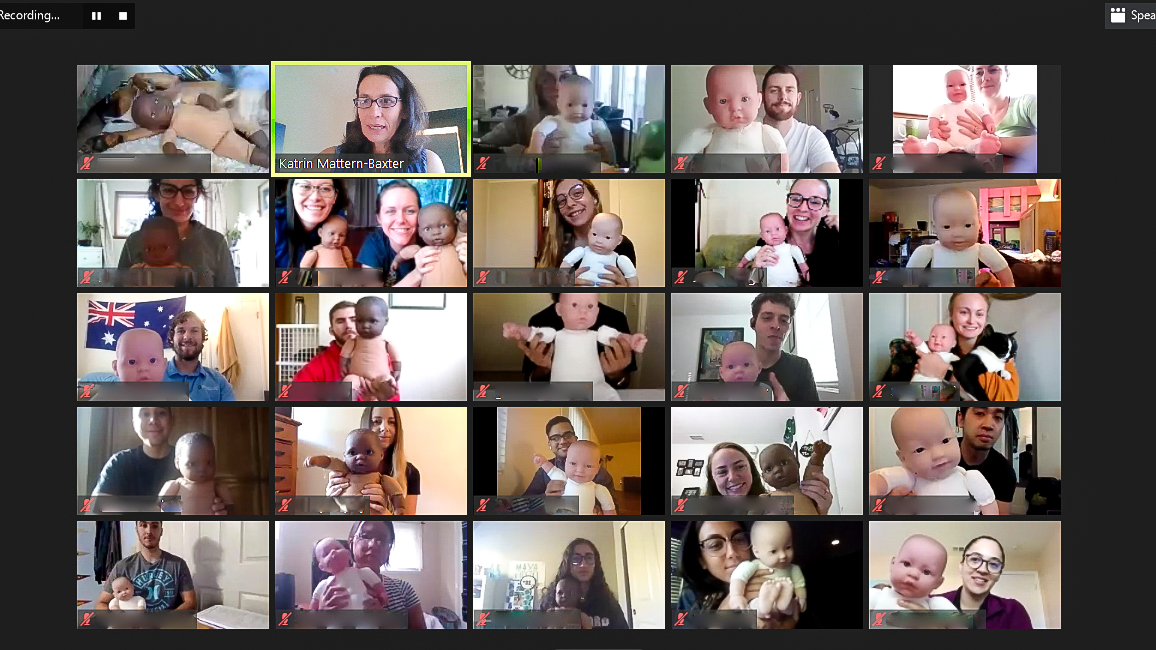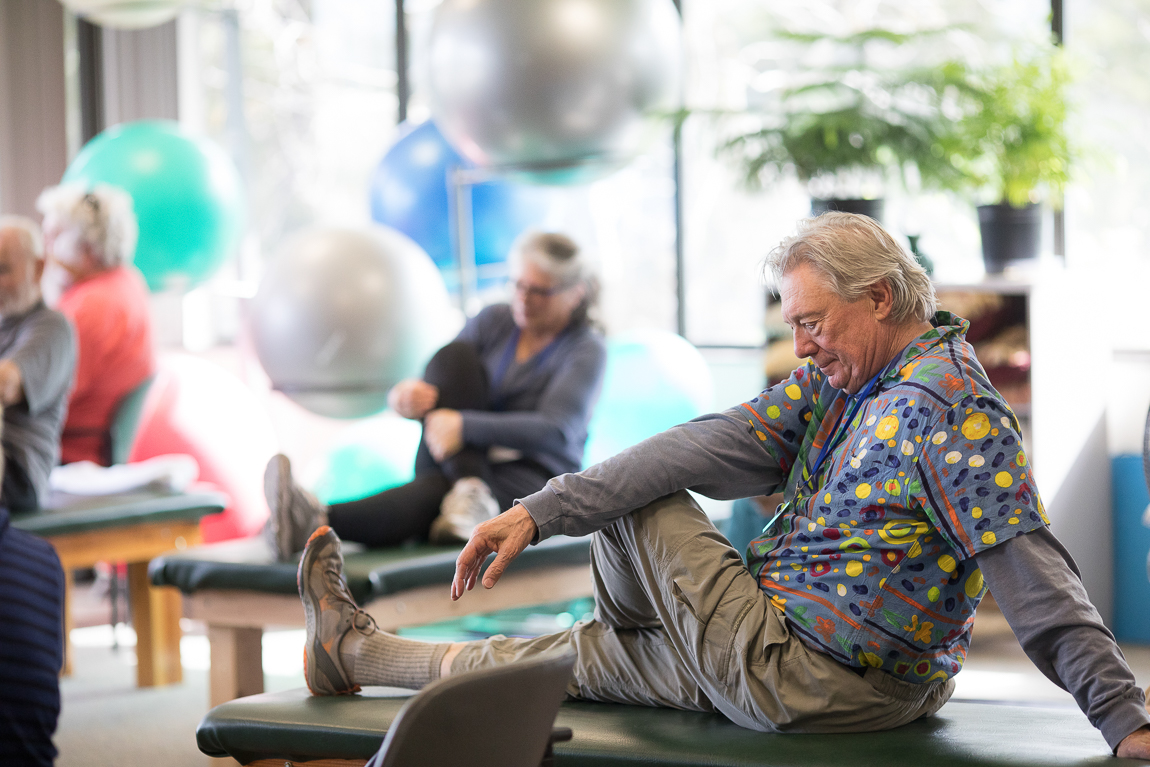
By Dixie Reid
When she learned that Sacramento State’s pro bono Physical Therapy (PT) clinics would go virtual this fall because of COVID-19, Professor Katrin Mattern-Baxter ordered 32 baby dolls for her students.
“Because we couldn’t bring patients to campus, I thought that the students who work with babies and toddlers who have delays in their motor skills could develop hands-on skills with the dolls,” she said. “Many students have never held a baby before.
“We have a telehealth clinic where students see children with developmental delays, and they use the dolls, for example, to show parents how to position their hands when they want to get their child from sitting to a standing position.”
“If this is how they deliver online sessions, I can only imagine that in person they will be more spectacular.”
Children who attend the virtual pediatrics clinics have a variety of diagnoses, including cerebral palsy, Down syndrome, spina bifida, genetic syndromes, and other developmental disabilities.
The work is serious, but the process can be a lot of fun. Take the case of Rydr Rudgers, a 12-year-old boy who was diagnosed with cerebral palsy and autism spectrum disorder.
“Rydr is a source of creativity for us,” said PT student Sarah Curd. “He is very aware that we work with him as physical therapists to improve his function, so he outright told us that in order to fight the dragons from Harry Potter, he needed to be stronger, faster, and more agile.”
 Before the COVID-19 pandemic caused so much of the University's education and outreach to go virtual, the Cardiovascular Wellness Center offered pro bono services in person. (Sacramento State/Andrea Price)
Before the COVID-19 pandemic caused so much of the University's education and outreach to go virtual, the Cardiovascular Wellness Center offered pro bono services in person. (Sacramento State/Andrea Price)To accommodate this imaginative preteen, Curd and her fellow PT students presented his treatments in unique scenarios. The standard stand-and-reach test, for instance, was presented as a storybook-like challenge: You are stuck in quicksand, but you need to punch the dragon.
“The students were absolutely amazing,” said Rydr’s mother, Elisa Rudgers. “They put so much time and effort into providing a detailed plan that included all of my son’s interests. They were able to get into his world and deliver a fun and engaging plan that he was eager to participate in.”
Rydr was so excited about his PT adventures that he asked to participate in additional sessions.
“If this is how they deliver online sessions, I can only imagine that in person they will be more spectacular,” Elisa Rudgers added.
The Department of Physical Therapy’s pro bono clinics have helped to improve the quality of life for countless men, women, and children in the community since 2006. Many turned to Sac State after exhausting their insurance benefits.
“Patients who attend the pro bono clinics are not being seen elsewhere,” said Michael McKeough, professor and department chair, who founded the clinics program to both serve the community and allow PT students to develop their skills under the supervision of licensed faculty.
“Once community interaction was shut down because of COVID-19,” he said, “our challenge became: How can we maintain some portion of that patient-care experience for our students prior to their full-time clinical rotations? Almost all health care facilities instantly had to go to telehealth to maintain patient services.”
Sac State canceled the remaining springtime PT clinics after the University pivoted to online learning in mid-March. PT faculty spent the summer – when no patient-care classes are offered – preparing to teach students and serve patients virtually this fall.
Typically, Sac State offers face-to-face pediatric, orthopedic, adult neurological, and amputee and limb difference clinics, as well as STEPS, a pediatric treadmill-training program. All take place on campus in Folsom Hall.
Because of the pandemic, the STEPS clinic, in partnership with Easter Seals Superior California, is on hold, as are the adult neurological clinics, out of concern for patient safety. Many in the neurological clinic have limited mobility and are at risk for falling. The PT department is planning for a clinic focusing on balance and fall-prevention.
The switch to telemedicine has proven a boon for the amputee and limb difference clinic, which has picked up more patients – some from as far away as England – offering PT students a richer and more diverse experience.
“I’ve had clinicians from around the world come in and do small-group discussions with the students,” said Professor Toran D. MacLeod, who launched the amputee and limb difference clinic in 2015. “So students not only hear from me, in my syntax, but from someone with a different clinical perspective or a social worker who is an amputee, as well.”
In the local community, MacLeod has developed a cohort of 20 to 25 patients who come year after year to attend the clinic.
“Many of them, I am confident, we have kept alive, because we will encourage them to take action on something, such as wound care, and it probably saved their life,” he said.
Sac State’s Doctor of Physical Therapy (DPT) is a three-year program that prepares graduates to provide excellent, knowledgeable patient care in any practice environment.
Sac State has one of the few DPT programs with a state-of-the-art simulation lab to educate students to care for and respond to emergencies with patients in an acute-care environment.
In addition to learning clinical reasoning through actual and simulated patient care, students complete 36 weeks of full-time internships at three California hospitals or clinics before graduation.
The first graduating class of Sacramento State’s DPT program was honored in July 2015 with a formal hooding ceremony in Capistrano Hall.
Sac State secured its independent doctoral program three years ahead of the deadline mandated by the Commission on Accreditation in Physical Therapy and was the first CSU authorized to offer an independent DPT program.